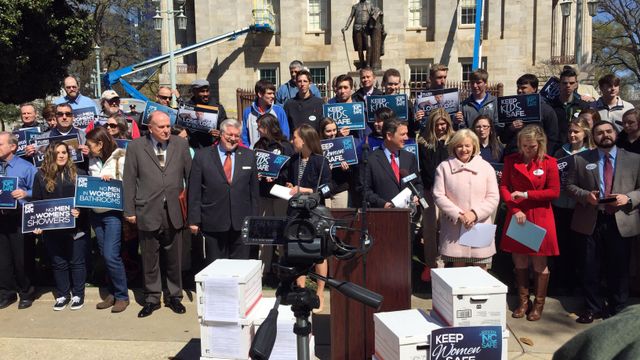Lawmakers to return Wednesday to address Charlotte nondiscrimination ordinance
Hours before state lawmakers announced they would return to Raleigh this week for a special session on a new Charlotte nondiscrimination ordinance, social conservatives rallied outside the State Capitol on Monday calling for the entire ordinance to be overturned.
Posted — UpdatedHouse Speaker Tim Moore emailed members Monday afternoon to notify them that the General Assembly would return to session on Wednesday. Gov. Pat McCrory indicated a short time before that that he wouldn't call a special session, but lawmakers can call a special session themselves if enough of them agree to do so.
The Charlotte ordinance broadly defines how businesses must treat gay, lesbian and transgender customers, but debate over it has focused on a provision that would allow transgendered people to use the bathroom in which they feel most comfortable.
Chloe Jefferson, a junior at Greenville Christian Academy, said she shouldn't have to share a bathroom or locker room with a boy, even if the boy identifies as a girl.
"I sympathize with those who are working through difficult personal issues. I imagine it’s very confusing," Jefferson said. "But being a teenage girl is really confusing too. I have a right to privacy and wish to not be exposed to young males changing and showering beside me."
Guilford County Sheriff B.J. Barnes said in a statement read at a news conference that law enforcement would have a hard time enforcing law against indecent exposure and sexual assault because officers couldn't be sure if someone was truly transgender or simply taking advantage of an ordinance such as Charlotte's
"The desires of a handful of people who are struggling with their sexual identity should not cause the majority of people to compromise their safety and privacy in public bathrooms, showers and locker rooms, and it should not place law enforcement personnel in the uncertain position of enforcing a law based on feelings, not facts," Barnes said.
The North Carolina Family Policy Council, the North Carolina Values Coalition and other groups delivered petitions with 13,000 signatures to McCrory and legislative leaders, calling on them to hold a special session to block the ordinance before it takes effect April 1. The regular 2016 session of the General Assembly doesn't start until April 25.
McCrory's legislative liaison, Fred Steen, sent a note to lawmakers late Monday indicating that the governor won't call a special session if lawmakers try to go beyond overturning the bathroom provision of the Charlotte ordinance. Draft legislation circulated over the weekend suggested lawmakers also want to take aim at living wage ordinances passed in some North Carolina cities.
"Anything above and beyond the bathroom issue should be dealt with during the full legislative session to allow public hearings and a broader discussion," Steen wrote.
Equality NC, an LGBT advocacy group, launched its own petition drive to urge lawmakers to leave the Charlotte ordinance alone.
"The fact that there is not a public safety risk posed by non-discrimination ordinances is not opinion – it’s been proven across the nation," Chris Sgro, executive director of Equality NC, said in a statement. "It is reckless to instill fear and hatred into public discourse for political gain, and members of the (General Assembly) must reject that."
More than 200 cities around the country have similar nondiscrimination ordinances, including Myrtle Beach and Columbia in South Carolina, and no public safety problems have been reported, Sgro and others noted last week at their own rally outside the Legislative Building.
John Rustin, president of the Family Policy Council, and others said Monday that Charlotte's ordinance should be overturned entirely, saying it violates the religious rights of business owners who may not wish to serve gay or lesbian customers.
"Similar ordinances have been used to force small business owners like florists, bakers, photographers and bed-and-breakfast owners and others either to confirm to a government-dictated viewpoint in violation of those sincerely held religious beliefs or to face legal charges, fines and other penalties that have ultimately caused some to go out of business," Rustin said.
"Every North Carolinian has the right to peacefully live and work in accordance to what they believe without being punished by the government," said Tami Fitzgerald, executive director of the N.C. Values Coalition.
Such so-called religious freedom bills have sparked controversy in other states, including Indiana and Georgia, and North Carolina legislative leaders last year sidetracked a similar proposal in the General Assembly.
Related Topics
• Credits
Copyright 2024 by Capitol Broadcasting Company. All rights reserved. This material may not be published, broadcast, rewritten or redistributed.






